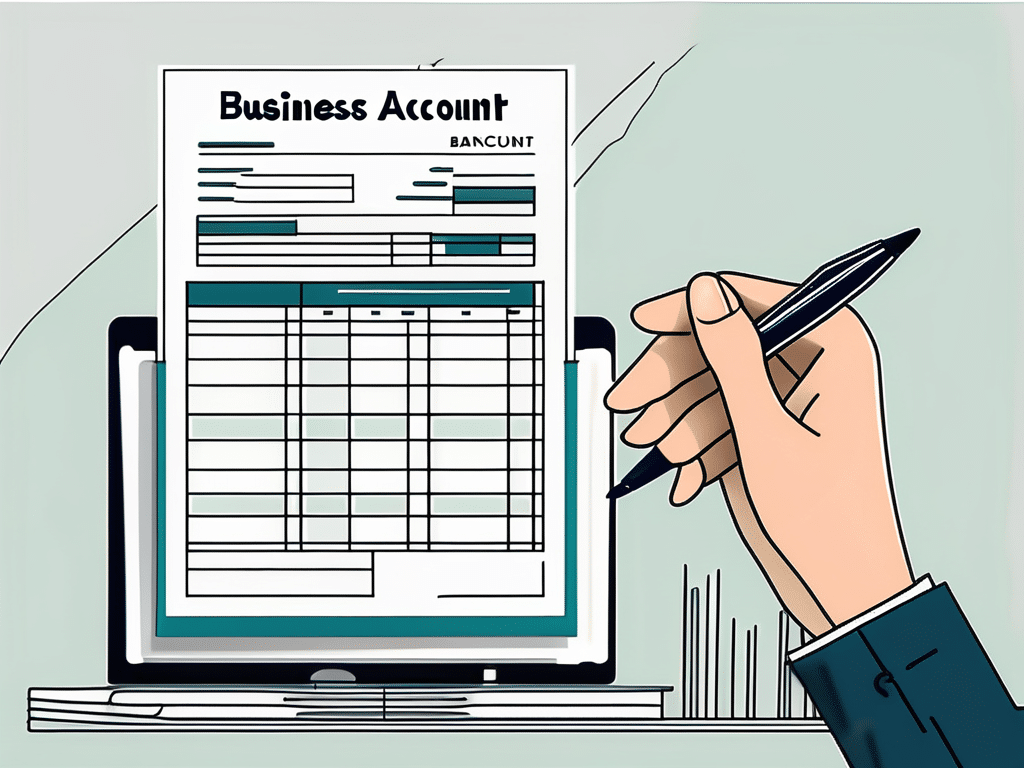Opening a business bank account is an essential step for any entrepreneur looking to establish a solid financial foundation for their company. A business bank account not only helps separate personal and business finances but also offers a range of benefits that can streamline your financial operations. In this article, we will guide you through the process of opening a business bank account in three easy steps.
Understanding the Importance of a Business Bank Account
Before delving into the steps required to open a business bank account, it is crucial to comprehend the significance of having one. A business bank account plays a pivotal role in the financial management of your company.

Establishing a business bank account is not just a formality; it is a strategic financial decision that can benefit your company in various ways. By segregating your personal and business finances, you create a clear distinction that is essential for financial transparency and accountability. This separation is not only a best practice for record-keeping but also a legal requirement for many businesses, ensuring compliance with regulations and facilitating audits.
The Role of a Business Bank Account
A business bank account serves as the main hub for your business transactions. It allows you to deposit and withdraw funds, make payments to suppliers and employees, and receive payments from clients. By keeping your personal and business finances separate, you can maintain accurate financial records and simplify your tax preparation process.
Moreover, a business bank account provides a centralized platform for monitoring your company’s cash flow and financial health. With features such as online banking and mobile apps, you can track transactions in real-time, set up automated payments, and generate financial reports effortlessly. This visibility into your business finances empowers you to make informed decisions and plan for the future effectively.
Benefits of Having a Separate Business Account
Aside from separation and organization, there are numerous benefits to having a separate business bank account. It instills professionalism, creates a sense of legitimacy, and enables better financial management. Moreover, having a business bank account can give you access to additional services such as business credit cards and loans, which can help fuel your company’s growth.
Furthermore, a business bank account enhances your company’s credibility in the eyes of customers, suppliers, and financial institutions. It demonstrates that your business is stable, reliable, and committed to proper financial management practices. This reputation can open doors to new opportunities, partnerships, and investments, strengthening your company’s position in the market.
Preparing to Open Your Business Bank Account
Now that you understand the importance of a business bank account let’s dive into the crucial steps to prepare for its opening.
Opening a business bank account is a significant milestone for any entrepreneur, as it helps separate personal and business finances, build credibility, and streamline financial transactions. To ensure a smooth process, meticulous preparation is key.
Necessary Documentation for Opening a Business Account
Before visiting banks, gather the necessary documentation that banks typically require to open a business bank account. This may include your business registration documents, identification proof, tax identification number, business licenses, and any other legal documents relevant to your business type.
Having these documents ready not only expedites the account opening process but also demonstrates your professionalism and commitment to financial responsibility to the bank.
Choosing the Right Bank for Your Business
Choosing the right bank for your business is a vital decision. Assess their fees, account features, and online banking capabilities. Consider banks with a local presence if you prefer in-person support. Also, seek recommendations from fellow business owners or consult with your accountant to find a bank that aligns with your specific needs.
Furthermore, look into the additional services and perks offered by different banks, such as business credit cards, merchant services, or business loans. A bank that provides comprehensive financial solutions can support your business growth and expansion in the long run.
Step-by-Step Guide to Opening a Business Bank Account
Now that you have prepared the necessary documents and chosen a suitable bank, let’s delve into the step-by-step process of opening a business bank account.

Opening a business bank account is a crucial step in establishing the financial foundation of your company. Not only does it help separate your personal and business finances, but it also provides a professional image to your clients and suppliers.
Step 1: Gathering Your Documents
Visit the selected bank with all the required documents. Depending on the bank, you may need to bring originals or certified copies. Ensure you have all the necessary paperwork before proceeding to the next step.
Common documents required for opening a business bank account include your business license, articles of incorporation, Employer Identification Number (EIN), and personal identification such as a driver’s license or passport.
Step 2: Choosing Your Bank and Account Type
At the bank, discuss your banking requirements with the representative and select the account type that best suits your business needs. Consider factors such as account fees, transaction limits, and account features. Be sure to ask any questions or seek clarification on any concerns you may have.
It’s essential to choose a bank that offers the services and support your business requires. Some banks work with small businesses, while others focus on larger corporations. Research different banks to find one that aligns with your financial goals and values.
Step 3: Completing the Application Process
Fill out the account application form provided by the bank. Provide accurate information about your business, its structure, and key personnel. Be prepared to provide your business identification documents and any additional information required by the bank. Review the application before submitting it and inquire about the estimated time to activate your account.
During the application process, the bank may also inquire about your business’s expected transaction volume, average account balance, and purpose of the account. Providing detailed and transparent information can help expedite the account opening process and ensure compliance with banking regulations.
Managing Your Business Bank Account
Once you have successfully opened your business bank account, it’s essential to manage it effectively to maximize its benefits. A well-managed business bank account can streamline your financial operations, provide valuable insights into your cash flow, and help you make informed decisions about your business’s financial health.
Furthermore, maintaining a healthy business bank account is crucial for building a strong financial foundation for your company. By effectively managing your account, you can establish credibility with financial institutions, suppliers, and potential investors, which can be beneficial for future business growth and opportunities.
Understanding Fees and Charges
Take the time to understand the fees and charges associated with your account. Banks may charge fees for various services such as transactions, wire transfers, or monthly maintenance. By familiarizing yourself with these costs, you can plan your finances accordingly and avoid any surprises. Additionally, consider discussing fee structures with your bank to see if there are ways to minimize or waive certain charges based on your business’s needs and transaction volumes.
Tips for Efficient Business Banking
To make the most of your business bank account, adopt efficient banking practices. Regularly reconcile your account statements, keep track of incoming and outgoing payments, and utilize online banking tools to simplify your financial management. Set up alerts for important activities to stay informed and maintain control over your finances. By staying organized and proactive in managing your account, you can optimize your business’s cash flow, identify potential issues early on, and make strategic financial decisions with confidence.
Closing Thoughts on Opening a Business Bank Account
Opening a business bank account is a critical step that deserves careful consideration and attention. By following the three easy steps outlined in this article, you can establish a solid financial foundation for your business. However, it is important to remain vigilant and avoid common pitfalls.

When opening a business bank account, it’s essential to choose a bank that offers the services and features that align with your business needs. Consider factors such as account fees, transaction limits, online banking capabilities, and customer service quality. Some banks may also provide unique services for certain industries, so be sure to explore all your options before making a decision.
Avoiding Common Pitfalls
Ensure you stay compliant with all banking regulations and maintain accurate records of your business transactions. Avoid mixing personal and business expenses in your account, as this can create confusion and complicate tax reporting. Regularly review your account statements and address any discrepancies promptly to avoid potential issues.
Additionally, it’s crucial to safeguard your account information and regularly update your security measures to prevent fraud and unauthorized access. Consider setting up alerts for unusual account activity and utilize multi-factor authentication for added protection.
Maximizing the Benefits of Your Business Account
Finally, remember to explore the additional benefits that your business bank account can offer. Consider applying for a business credit card or establishing a business line of credit to help manage cash flow and build credit history for your company. Regularly evaluate your banking needs as your business grows and take advantage of any relevant financial services provided by your bank.
By carefully opening and managing your business bank account, you can establish a strong financial foundation and focus on growing your business with confidence


